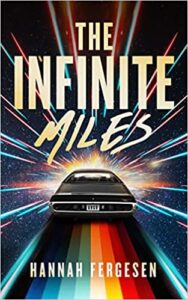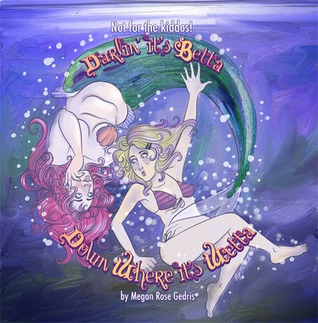This was such a let down.
I used to be a big fan of Doctor Who (see my review of Queers Dig Time Lords) and am currently trying to catch up on the newest seasons. So when I saw a queer sci-fi book coming out that drew inspiration from Doctor Who, it sounded like the perfect entertaining audiobook listen.
When I read the description, it seemed even more fun. The Doctor character, the Argonaut, doubled as a David Bowie-esque singer! Instead of the Tardis, there’s Argo, a shapeshifting sentient spaceship that is often a muscle car. The main character, Harper, and her best friends Peggy, were huge fans of the TV show Infinite Voyage, until the real-life Argonaut swept Peggy away for adventure, leaving Harper behind. When Peggy is taken over by a dangerous alien parasite called the Incarnate, Harper has to join the Argonaut to save Peggy and the universe with the power of love!
Each of these components sounds like a wacky space adventure that matches the fun of watching an old Doctor Who episode. The problem is that despite all of this, the tone is decidedly dour. Harper is an angry, resentful main character. She hates the Argonaut for getting Peggy into this situation. She is still angry that Peggy left to go on an adventure with their shared hero without telling her.
The Argonaut brings no more levity to the situation. He feels guilty for what happened to Peggy, and he’s given up on being able to help anyone. When Harper and the Argonaut meet, they have one conversation before he abandons her in the 1970s “for her own safety,” to Harper’s fury. She then scrambles to survive, try to find a way out, and search for answers of how to help Peggy.
This ended up feeling like a slog to me, especially because I was expecting a romp through space and time. Maybe this is better suited to Doctor Who fans who preferred the Matt Smith run.
Then, because this is the Lesbrary, we have to address the queer content, because I spent 80% of the book not sure if it had a queer main character. We do get a single chapter from the Argonaut’s perspective, where we see his background, which was my favourite part of the book. Miles (his actual name) was a queer kid growing up in a small town where he didn’t fit in, and as a young man, he’s taken in by the Argonaut Jason (as Miles dubs him). He later becomes his own idol, the David Bowie-esque singer, to inspire his younger self. He also changes sex and gender with Argo’s help several times, in a similar way to the Doctor’s regeneration, but by choice.
As for our main character, Harper, we don’t get confirmation that she’s queer until near the end of the book. It’s kind of treated as a big reveal, that she’s in love with Peggy and could never admit it, but I don’t subscribe to sexuality as a plot twist, and besides, this being reviewed on the Lesbrary tells you there’s eventual confirmation the main character is queer. Treating this as a reveal felt weird to me, especially because we’re in Harper’s head almost the entire book. The last time Peggy and Harper saw each other before Peggy went missing is referenced throughout, but we only get the flashback at the end, which is when Harper (almost, kind of, but not quite) admits her real feelings for Peggy. To be clear, I don’t mean this in a This Author Is Problematic way, just that it personally rubbed me the wrong way. Miles and Peggy’s queerness is present from the beginning.
This paragraph has spoilers for the end of the book. In some version of this story, I think this reveal maybe could have worked–especially if we already knew Harper was queer/bisexual from the beginning, but it was her feelings specifically for Peggy that she was repressing. Then, the power of queer love could save the universe at the end–I’m definitely not above that story! But while the universe and Peggy are saved at the end, when Harper wakes up at the hospital, Peggy has left. We spend the whole book waiting for Harper and Peggy to get back to each other, and then there is precisely zero interaction between them after the climactic battle between good and evil. There’s no resolution to their relationship (whether friendship or romantic relationship), even though it was the core of the entire story. And Peggy ends up feeling kind of disposable to the narrative: the “happy ending” just involves Miles and Harper going on adventures. We don’t know anything about post-Incarnate Peggy (and only a little about Peggy in general). Why did she leave? Where did she go? Is she happy? (End of spoilers)
I ended up finishing this audiobooks on about 2.6 speed, because I just wanted to get to the end. Unfortunately, it didn’t deliver for me. This has a high average rating on Goodreads, so I appear to be alone in this, but it was the mismatch between tones as well as the treatment of Harper’s feelings for Peggy that didn’t work for me. Maybe if I had been prepared for it to be a heavy read and not a fun space adventure, I might have liked it more—but in my defense, the description for this book calls it a “wacky time-traveling sci-fi odyssey wrapped in an elegiac ode to lost friendship and a clever homage to Doctor Who,” so I think I can be forgiven for thinking it would be fun and not bleak!
This was one I was so excited for and ended up feeling disappointed.




